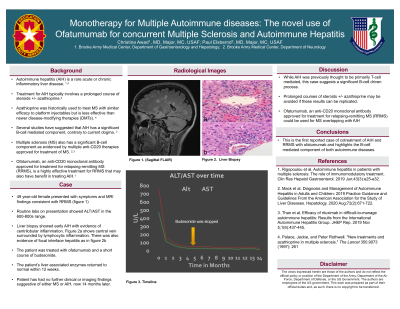Back


Poster Session B - Monday Morning
Category: Liver
B0544 - Monotherapy for Multiple Autoimmune Diseases: The Novel Use of Ofatumumab for Concurrent Multiple Sclerosis and Autoimmune Hepatitis
Monday, October 24, 2022
10:00 AM – 12:00 PM ET
Location: Crown Ballroom

Has Audio

Christina Awad, MD
San Antonio Military Medical Center
Fort Sam Houston, TX
Presenting Author(s)
Christina Awad, MD, Paul Elsbernd, MD, MS
San Antonio Military Medical Center, Fort Sam Houston, TX
Introduction: Autoimmune hepatitis (AIH) is a rare acute or chronic inflammatory liver disease, that can be associated with a variety of extrahepatic disorders, such as multiple sclerosis (MS). AIH has been reported both during and after treatment with immunomodulatory drugs for MS, such as interferon-beta and steroids, with its incidence in MS being 10-fold higher than the general population. Typically, those patients are treated with steroids and azathioprine as the first line of treatment according to AIH guidelines. However, in comparison to newer disease-modifying therapies (DMTs) for MS, azathioprine is less effective and requires further study. Notably, several studies have suggested a role for B-cell-driven autoimmune liver injury in AIH, and there have been reports of refractory AIH being successfully treated with rituximab, an anti-CD20 monoclonal antibody. Based on these results and the well-known role of B-cells in the underlying pathophysiology of MS, we postulated that anti-CD20 therapy may be effective in treating patients with concurrent MS and AIH, thereby helping to limit steroid duration and avoid the use of azathioprine.
Case Description/Methods: We report the case of a 49-year-old previously healthy female who presented with symptoms and magnetic resonance imaging (MRI) findings consistent with relapsing-remitting MS (RRMS). On routine labs at initial presentation, she was incidentally found to have ALT/AST in the 500's range. An extensive work-up was completed, including a liver biopsy that showed a centrilobular necroinflammatory injury pattern suggest of early AIH without cirrhosis. The patient was started on oral budesonide followed by ofatumumab, an anti-CD20 monoclonal antibody approved for treatment of RRMS, as steroids were weaned. The patient’s liver enzymes returned to normal ranges within 12 weeks and have remained so now for approximately 8 months. Additionally, she has had no new clinical or imaging findings suggestive of MS disease activity. We present this as the first-reported case of the use of an anti-CD20 monoclonal antibody to treat both MS and AIH concurrently.
Discussion: This case furthers our understanding of AIH by suggesting that the pathophysiology contributing to AIH is predominately B-cell related as this patient’s AIH was successfully treated with ofatumumab and a short course of budesonide. It highlights a possible alternative treatment modality for AIH that avoids a prolonged course of steroids and/or azathioprine. More research is still needed however.
Disclosures:
Christina Awad, MD, Paul Elsbernd, MD, MS. B0544 - Monotherapy for Multiple Autoimmune Diseases: The Novel Use of Ofatumumab for Concurrent Multiple Sclerosis and Autoimmune Hepatitis, ACG 2022 Annual Scientific Meeting Abstracts. Charlotte, NC: American College of Gastroenterology.
San Antonio Military Medical Center, Fort Sam Houston, TX
Introduction: Autoimmune hepatitis (AIH) is a rare acute or chronic inflammatory liver disease, that can be associated with a variety of extrahepatic disorders, such as multiple sclerosis (MS). AIH has been reported both during and after treatment with immunomodulatory drugs for MS, such as interferon-beta and steroids, with its incidence in MS being 10-fold higher than the general population. Typically, those patients are treated with steroids and azathioprine as the first line of treatment according to AIH guidelines. However, in comparison to newer disease-modifying therapies (DMTs) for MS, azathioprine is less effective and requires further study. Notably, several studies have suggested a role for B-cell-driven autoimmune liver injury in AIH, and there have been reports of refractory AIH being successfully treated with rituximab, an anti-CD20 monoclonal antibody. Based on these results and the well-known role of B-cells in the underlying pathophysiology of MS, we postulated that anti-CD20 therapy may be effective in treating patients with concurrent MS and AIH, thereby helping to limit steroid duration and avoid the use of azathioprine.
Case Description/Methods: We report the case of a 49-year-old previously healthy female who presented with symptoms and magnetic resonance imaging (MRI) findings consistent with relapsing-remitting MS (RRMS). On routine labs at initial presentation, she was incidentally found to have ALT/AST in the 500's range. An extensive work-up was completed, including a liver biopsy that showed a centrilobular necroinflammatory injury pattern suggest of early AIH without cirrhosis. The patient was started on oral budesonide followed by ofatumumab, an anti-CD20 monoclonal antibody approved for treatment of RRMS, as steroids were weaned. The patient’s liver enzymes returned to normal ranges within 12 weeks and have remained so now for approximately 8 months. Additionally, she has had no new clinical or imaging findings suggestive of MS disease activity. We present this as the first-reported case of the use of an anti-CD20 monoclonal antibody to treat both MS and AIH concurrently.
Discussion: This case furthers our understanding of AIH by suggesting that the pathophysiology contributing to AIH is predominately B-cell related as this patient’s AIH was successfully treated with ofatumumab and a short course of budesonide. It highlights a possible alternative treatment modality for AIH that avoids a prolonged course of steroids and/or azathioprine. More research is still needed however.
Disclosures:
Christina Awad indicated no relevant financial relationships.
Paul Elsbernd indicated no relevant financial relationships.
Christina Awad, MD, Paul Elsbernd, MD, MS. B0544 - Monotherapy for Multiple Autoimmune Diseases: The Novel Use of Ofatumumab for Concurrent Multiple Sclerosis and Autoimmune Hepatitis, ACG 2022 Annual Scientific Meeting Abstracts. Charlotte, NC: American College of Gastroenterology.
